Things to Know About England
Things to Know About England in 2025
England is one of three countries on the island of Great Britain, along with Scotland and Wales. England, which occupies the central and southern part of the island of Great Britain, has two border neighbors: Wales to the west and Scotland to the north. England, together with Scotland and Wales, forms Great Britain, and with Northern Ireland included in these three countries, it forms the state known as the United Kingdom. The United Kingdom is governed by a constitutional monarchy and its capital is London.
The article provides information about what you need to know about England, using the most up-to-date data.
What is England Like in 10 Points?
Things you need to know about England are listed below in 10 items.
- England is currently a constitutional monarchy within the United Kingdom under a parliamentary democracy, and is directly controlled by the Parliament of the United Kingdom. England has not had its own government since 1707, when it was united with Scotland to form the Kingdom of Great Britain.
- There are four levels of political subdivision within the borders of England, the highest level of which are the nine major regions of Greater London, South East England, South West England, West Midlands, North-West England, North East England, Yorkshire and the Humber, East Midlands and East England. In addition to the nine regions of England, there are 48 ceremonial counties, counties and parishes at lower levels.
- The UK economy, one of the world’s largest economies, is highly complex and diverse in manufacturing and service sectors. The prominent sectors are finance, banking, chemicals, pharmaceuticals, aviation, shipbuilding, tourism and software/information technology. The capital of England, London, is one of the world’s largest financial centers and the largest and wealthiest region in the United Kingdom.
- England is the largest geographical region within the United Kingdom, with a population of over 55 million, and London is the largest city in England, with a population of 9 million.
- The official language of England is English; however, there are different dialects of English spoken throughout England. With the increase in immigration to England in recent years, languages such as Punjabi and Urdu have become widespread in the country.
- The most widespread religion in England throughout history has been Christianity, and accordingly the established church of England is the Anglican Christian Church. The Anglican Church has a constitutional position in England. Other religions that are widespread in England besides Christianity are Islam, Hinduism, Judaism, Buddhism, the Rastafari Movement, and Neopaganism.
- England comprises approximately two-thirds of the island of Great Britain, plus the offshore areas of the Isle of Wight and the Isles of Scilly, covering a total area of 130,279 km². England has a topography consisting mostly of gently undulating hills and plains, and is also home to several rivers, one of which is the famous River Thames, which runs through London.
- The climate in England is temperate maritime, with mild summers and winters. Most of the year is rainy, with average temperatures in January being 1 °C and in July being 21 °C.
- England is separated from France and the European continent by a 34 km long canal. The channel, called the English Channel or the English Channel, which separates England and France, contains the world’s longest tunnel, the Channel Tunnel, which connects Dover and Calais.
- Many of the universities in England are ranked among the best universities in the world. The best universities in England are the University of Cambridge, Imperial College London, University of Oxford and University College London.
On Which Continent Is England Located?
England is located on the European continent.

What is the Surface Area of England?
According to the 2021 data of the United Kingdom government, the surface area of England is 130,279 km² and there are 434 people per km². England is the 99th largest country in the world in terms of surface area.
Which countries are neighboring England?
England lies along the southeast and southwest of the island of Great Britain and is one of three countries on the island, along with its neighboring countries. England has two land neighbors: Scotland to the north and Wales to the west.
Is There a Sea in England?
There is sea in England. England faces the Atlantic Ocean in the northwest, the North Sea in the north and east, the Irish Sea in the west and finally the English Channel in the south. The English Channel is the sea between France and England and is used by England as the English Channel.
How Many Kilometers is the UK Coastline?
The UK has a coastline of 4,422 km. The UK ranks 33rd among the countries with the longest coastline in the world.
What are the Geographical Features of England?
It occupies the central and southern two-thirds of the island of Great Britain, which it shares with England, Wales and Scotland. England is separated from the European continent by the 52 km wide English Channel.
The north of England, which is largely covered with low hills, is relatively mountainous, with the Pennine Mountains dividing the country from north to south. The mountains in England are not very high, and the highest point in the country is Scafell Pike at 978 m. There is a flat marshland in the east of England, much of which has been drained for agricultural purposes and is called the Fens. England has important rivers such as the Trent, Ouse and Severn, and its most famous river is the Thames, which flows through the middle of the capital, London.
England has coasts on the Atlantic Ocean, the North Sea, the Irish Sea and the English Channel. Major ports such as Manchester and Liverpool are of great importance to the geography and economy of England and have directly contributed to the development of the country’s industry. Poole, England’s largest natural harbour, is known as the second largest natural harbour in the world.
What are the climate characteristics of England?
England has a temperate maritime climate, with mild winters and cool, mild summers. England, which has few sunny days, benefits from the warm water currents of the Gulf Stream due to its geographical location, and the country’s climate is shaped accordingly.
The climate of England is characterized by rainfall for most of the year, and the country’s average annual rainfall is around 855 mm. The warmest month in England is July, while the coldest month is January. The regions with the highest annual average temperatures in England are the south of the country and the Isles of Scilly, and the region with the lowest annual average temperatures is Newport, Shropshire.
What does England belong to?
It is one of the countries that make up the United Kingdom, along with England, Scotland, Wales and Northern Ireland.
When Was England Founded?
England is located on the island of Great Britain, which has been inhabited for approximately 800,000 years, according to archaeological evidence found particularly in Happisburgh, Norfolk. Germanic tribes, namely the Anglo-Saxons, migrated to England in the 4th century.
After the collapse of Roman rule in Britain, the Anglo-Saxons settled in the region and established rival petty kingdoms. England faced Scandinavian invasions between the 8th and 11th centuries. Years of conflict and war between the petty kingdoms on the island of Great Britain delayed the political unification of England and had a direct impact on English history. England united with Scotland in 1707 to form Great Britain.
What Language Is Spoken In England?
The de facto official language of the United Kingdom is English, spoken by approximately 59.8 million residents, or 98% of the population over the age of three.
Although 98% of the country speaks English, the official language of the United Kingdom, local languages and English dialects are also spoken in the United Kingdom, especially Scots, Welsh, Irish. As the United Kingdom has received a lot of immigrants in recent years, languages that have become more common in the country include Polish, Urdu, Punjabi, Arabic and Chinese.
What is the United Kingdom Form of Government?
The United Kingdom’s form of government is a constitutional monarchy. The United Kingdom became a constitutional monarchy after the Bill of Rights was declared following the Glorious Revolution of 1688–89.
What is the Parliament Structure Like in England?
The United Kingdom is a constitutional monarchy with a multi-party bicameral parliamentary democracy. The head of state is the monarch, with the prime minister serving as head of government and the cabinet.
In England, the executive is a power exercised by the government, but this power is exercised on behalf of the monarch and with the monarch’s approval. The executive is also exercised by the governments of Wales, Scotland and Northern Ireland, which make up the United Kingdom. In terms of the legislative power, the English parliament has a dual and separate structure. The English House of Lords, which is formed by the nobility and is appointed by the Queen or parties, and the lower house, the English House of Commons, whose members are elected for a maximum of five-year terms, together form the United Kingdom Parliament. The UK Parliament’s duty within UK politics is to make laws, and this duty is also performed by the Scottish Parliament, the National Assembly for Wales and the Northern Ireland Assembly.
What is the Political Map of England Like?
The political map of England is given below.
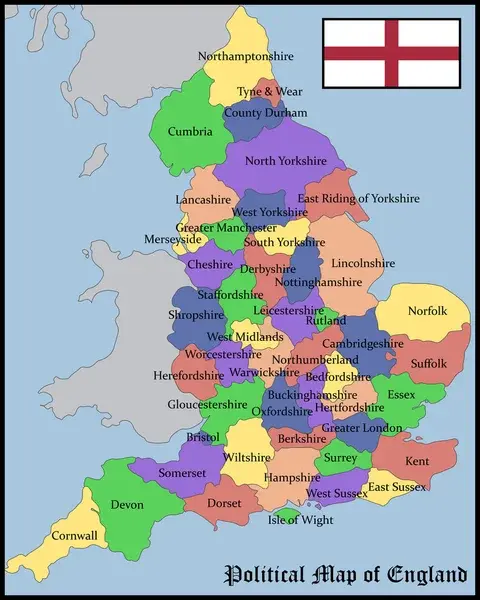
What are the Counties of England?
The counties of England are listed below.
- Greater London
- South East England
- South West England
- West Midlands
- North West England
- North East England
- Yorkshire and the Humber
- East Midlands
- East of England
What are the Cities of England?
Cities in England are listed below.
- Bath
- Birmingham
- Bradford
- Brighton and Hove
- Bristol
- Cambridge
- Canterbury
- Carlisle
- Chester
- Chelmsford
- Chichester
- Coventry
- Derby
- Durham
- Elly
- Exeter
- Gloucester
- Hereford
- Kingston upon Hull
- Lancaster
- Leeds
- Leicester
- Lichfield
- Lincoln
- Liverpool
- City of London
- Manchester
- Newcastle upon Tyne
- Norwich
- Nottingham
- Oxford
- Peterborough
- Plymouth
- Portsmouth
- Preston
- Ripon
- Salford
- Salisbury
- Sheffield
- Southampton
- St Albans
- Stoke-on-Trent
- Sunderland
- Truro
- Wakefield
- Wells
- Westminster
- Winchester
- Wolverhampton
- Worcester
- York
What is the Capital of England?
The capital of England is London. With a population of over 9 million, London is the capital and most populous city of England. One of the most multicultural cities in the world, London is the 4th most populous city in Europe after Istanbul, Moscow and Paris. A city with a high population throughout history, London was founded in 43 BC by the Roman Empire under the name Londinium.
London is one of the world’s leading cities in many different fields, including art, commerce, education, entertainment, fashion, finance, healthcare, media, professional services, research and development, tourism and transportation. London specializes in finance, and is the second most important city in the world after New York.
The London Underground, which has the oldest subway in the world, was opened in 1863. London, a city with a very developed transportation network, has five major airports: Heathrow, Gatwick, Stansted, Luton and London City.
London is one of the cultural capitals of the world. The city that produces the third most films in the world, London is also the city with the highest number of theatergoers in the world. There are more than 170 museums and many art galleries in London, including the British Museum.
One of the world’s leading educational centers, London is the city with the highest concentration of higher education institutions in Europe. Leading educational institutions such as University College London (UCL), Imperial College London, London School of Economics and King’s College London (KCL) are located in London. The largest university in Britain, the University of London, is located in London and has over 170,000 students.
What is the population of England?
According to UK government data, the population of England in 2021 was 56.5 million, making it 84% of the UK population. The area of England is 130,279 km², with a population density of 434 per km².
The southeast of England is a region where both British and immigrants are concentrated due to its high economic prosperity. While many immigrants have come to England from European countries such as Ireland, Germany and Poland, there has also been a large number of immigrants from former British colonies such as Pakistan, India and Bangladesh, as well as from Africa and the Caribbean. In addition to the British and immigrant population, England also has a native population called the Cornish.
UK Home Office data shows that there are approximately 850,000 Turks living in the country. According to UK official data, the UK Turkish population is concentrated in London and accordingly, approximately 450,000 Turks live in London.
Which is the Most Populous City in England?
The most populous city in England is London. The population of London is 9 million in 2020, according to the Greater London Authority.
What is the UK’s economy like?
The UK economy is nominally the 5th largest economy in the world, with a social market and market-oriented economy. The UK’s gross domestic product (GDP) is $2.7 billion, with a GDP per capita of just over $40,000. Agriculture accounts for 0.6% of the UK economy, construction 6.4%, industry 14.6%, and services 78.4%.
The sectors within the service activities have the most important share in the economic activities of England. The most developed sectors of the English economy are finance, banking, aviation and space industry and the pharmaceutical industry. While the cities of Manchester and Liverpool and the ports in these cities were of great importance to the English economy during and after the Industrial Revolution, the importance of London, the world’s second largest financial center today, is vital to the English economy. The English economy has shifted towards service activities since the second half of the 20th century and high value-added products have gained importance instead of heavy industry products.
What is British Currency?
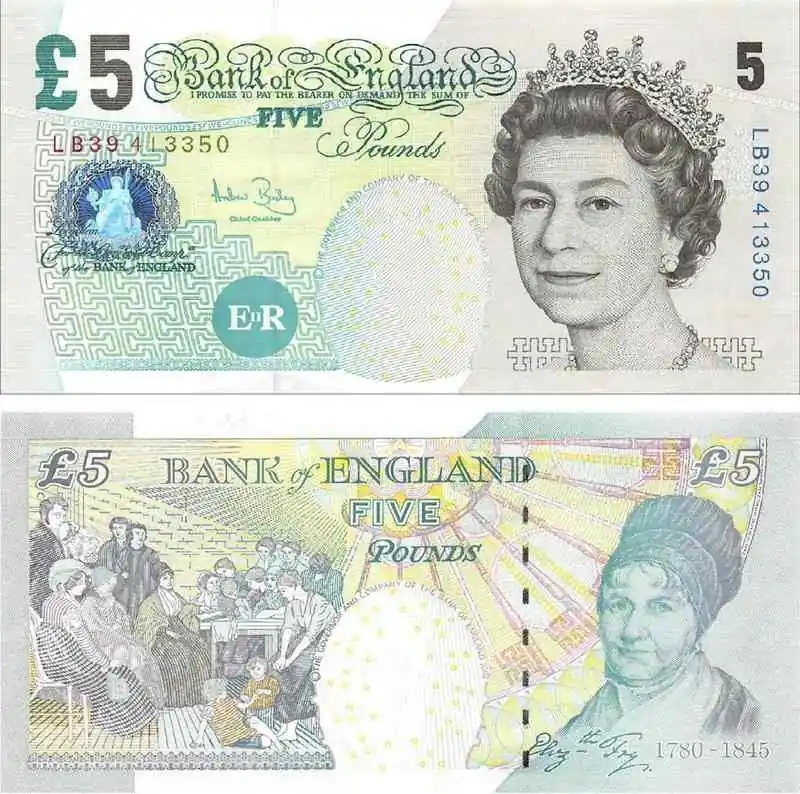
The currency of the United Kingdom is the British pound. The international abbreviation for the British pound, also known as the pound, is GBP.
Is the UK a Member of the EU?
No, the UK is not a member of the EU. Disagreements on issues such as sovereignty, immigration, the economy and anti-establishment policies, as well as other factors, led the UK to decide to leave the EU. In 2016, the UK Brexit referendum resulted in a decision to leave the EU with 51.8% of the vote, and the UK’s withdrawal from the EU was completed in 2020.
Is England a Member of NATO?
The United Kingdom is a member of NATO. The United Kingdom was one of the 12 countries that founded NATO in 1949. The United Kingdom’s military is the third strongest in NATO after the United States and France. 60% of the British public have a positive view of the country’s NATO membership, and this view has remained relatively stable over the years.
What is the Military Power of the UK?
The United Kingdom’s military, known as the United Kingdom Armed Forces, was established in 1707 and consists of the Navy, the Army, and the Air Force. The United Kingdom’s military, which is directly subordinate to the royal family and is officially known as Her Majesty’s Armed Forces, consists of 194,170 active personnel and has a 2021 budget of $80.5 billion. Conscription has not been compulsory in the UK since 1963.
What is the British Navy Like?
The British Navy, known as the Royal Navy, has been active since the 16th century and is one of the three main branches of the United Kingdom Armed Forces. The British Navy, which has 34,130 active personnel, has 177 aircraft, 2 aircraft carriers, 2 amphibious assault ships, 2 amphibious transport docks, 6 destroyers, 13 frigates, 10 submarines and 13 minesweeping ships in its inventory.
What Are Living Conditions Like in the UK?
The United Kingdom ranks 14th in terms of living standards according to the OECD index.
In the UK, people spend 23% of their income on home ownership, slightly above the OECD average of 20%. UK residents live in homes with an average of 2 rooms per person, above the OECD average of 1.7. The UK has a slightly higher quality of life than the OECD average for housing.
In terms of income, the UK is above the OECD average. The average household net adjusted disposable income per capita in the UK is $33,049 per year, above the OECD average of $30,490. In terms of average household wealth, the UK is $524,422, well above the OECD average of $323,960.
In the UK, around 11% of workers work very long hours in paid work, slightly above the OECD average of 10%, and this can harm personal health, compromise safety and increase stress. Full-time workers in the UK spend an average of 62% (14.9 hours) of their day on personal needs such as eating and sleeping, and leisure (such as socialising with friends and family, hobbies, games, using computers and watching television), very close to the OECD average of 15 hours.
Life expectancy, one of the most important indicators of living standards and health quality, is 81.3 years in the UK (an average of 83 years for women and 79 years for men), which is slightly above the OECD average of 81. The UK’s general health parameters present a value quite close to the OECD average.
In the UK, 82% of adults aged 25-64 have completed upper secondary education, above the OECD average of 79%. The average student in the UK scores 503 in literacy, mathematics and science on the OECD Programme for International Student Assessment (PISA), higher than the OECD average of 488, suggesting that the UK education system is better than most OECD countries. The UK’s well-being is above the OECD average across a range of parameters, including education, health, income and work-life balance.
What is the Crime Rate in England?
According to the UK government’s 2021 data, there were 75 crimes per 1,000 people in the UK. The most common crimes committed in the UK in 2021 were violence, sexual assault and crimes aimed at disrupting public order. The UK ranks 64th in the world according to the crime index, ahead of Turkey, which is 88th in this ranking. The UK, which is relatively middle-ranked in the world crime index ranking, is 6th in Europe.
What is the Education System Like in England?
The UK education system is directly managed by the UK Department for Education and the Department for Business, Innovation and Skills. The UK has an education system above the OECD average, with a literacy rate of 99%. Education in the UK is divided into four stages: basic level (3-5 years), primary education (5-11 years), secondary education (11-18 years) and higher education (+18 years). Higher education in the UK generally begins with a three-year undergraduate education, followed by masters and doctorate degrees, i.e. postgraduate degrees, as the final stage of education.
England, University College London (UCL), Imperial College London, London School of Economics and King’s College London (KCL), Oxford University and Cambridge University are among the best universities in the world. According to the QS 2022 World Rankings, 4 schools from England are among the top 10 universities in the world. Oxford University is ranked 2nd, Cambridge University is ranked 3rd, Imperial College London is ranked 7th and University College London is ranked 8th.
What is the UK’s Health System Like?
The National Health Service, known as the National Health Service in England, has been funded by general taxation since 1948 and provides free and comprehensive health services to residents of the country. Although patients using the National Health Service in England must pay prescription fees, some groups, such as those over the age of 60 and those receiving public benefits, are exempt from prescription fees.
In terms of functioning, healthcare services in the UK operate with a social state approach and are ranked 13th overall in the World Healthcare Innovation Index, making them one of the best healthcare systems in the world.
What Are the Culture and Traditions of England?
British culture has been influenced by the history of all the nations that make up Britain, and historically, Christian religious life, European cultures, and the traditions of England, Wales, Scotland, and Ireland have influenced British culture. Although it is possible to evaluate English culture separately from British culture, it is observed that English culture overlaps in some places with the cultures of Scotland, Wales, and Northern Ireland, and differs in some places.
The culture of drinking tea is one of the most famous British traditions. The British like to consume milky tea and biscuits at a time known as five o’clock tea, which is approximately the afternoon. To relieve the stress of the day, the British go to the bar after work and socialize with their friends by drinking beer, thus continuing the famous British pub culture.
Dance has a significant place in English traditions. Originating in the evening dances of peasants in the 15th century, Morris Dancing is one of the traditional dances of England. With a tradition of over 500 years passed down through generations, Morris Dancers are often seen dancing to impress the crowds at most Summer Festivals.
British traditions and culture have recently become influenced by many different cultures due to the increasing immigrant population in the country, and these influences are particularly reflected in British cuisine. From döner to chicken tikka masala, spaghetti bolognese to various desserts, the dishes brought by immigrants have enriched British cuisine.
What is British Food Culture Like?

British cuisine is heavily influenced by world cuisine, as England is a cosmopolitan country. British people usually consume ham, milk tea, toast and fried mushrooms in their meals.
Famous dishes of England, where meat varieties, potatoes and boiled vegetables are mainly used, are fish and chips, traditional English tea, jacket potatoes, Yorkshire pudding and baked beans.
What is the UK Music Culture Like?
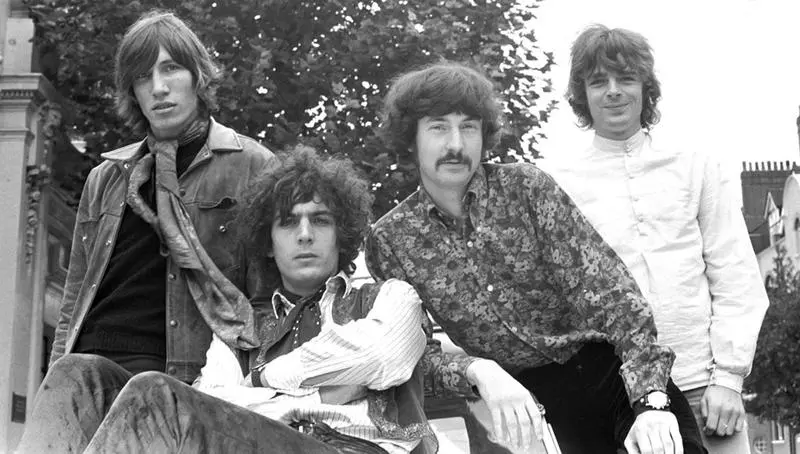
The UK music culture dates back centuries and today the British music industry is one of the largest in the world. The UK music industry experienced a period known in the US as the “British Invasion” in the 1960s and witnessed the rise of bands such as The Beatles, The Rolling Stones, Pink Floyd and Led Zeppelin, who were originally influenced by American bands but added their own touches to that music.
The British music industry was shaped by many world-famous artists and groups such as Bee Gees, Queen, Oasis, David Bowie, and Radiohead in the last quarter of the 20th century after the 1970s. World-famous British music has been performed by famous artists and groups such as Arctic Monkeys, Coldplay, Adele, Ed Sheeran, Amy Winehouse, and Franz Ferdinand since the 2000s.
Who Are The Most Famous British Musicians?
The most famous musicians of England, home to world-famous musicians, are listed below with their most recognizable works.
- John Lennon-Imagine
- Freddie Mercury (Queen) – We Are The Champions
- David Bowie – Space Oddity
- Paul McCartney (The Beatles) – Yesterday
- Ed Sheeran – Shape Of You
What is the UK Cinema Culture Like?
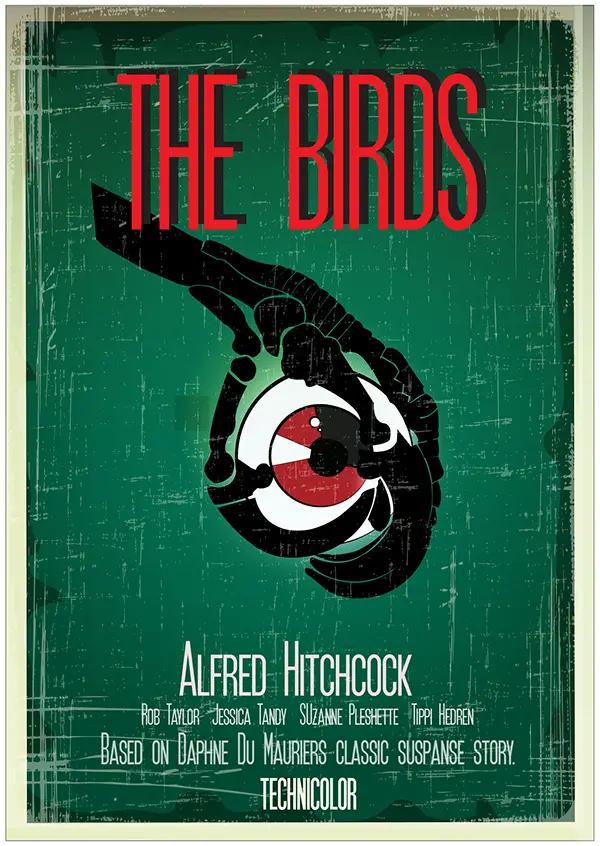
Britain has been instrumental in the technological, commercial and artistic development of cinema, and is the second largest producer of film stars worldwide after the United States. British cinema reached its golden age in the 1940s with the films produced by the studios of J. Arthur Rank and Korda. Modern cinema evolved from the work of the French Lumière brothers in 1892, and the Lumière brothers’ shows first came to London in 1896. The first motion pictures were produced on celluloid film in 1889 by William Friese in Hyde Park, London.
There are many world-famous directors and actors of British origin. From Charlie Chaplin, who directed films such as The Kid and Modern Times in the 1920s when sound was not yet used in films, to Christopher Nolan, who has made some of the best British films, such as Batman, Interstellar and Inception, to Alfred Hitchcock, who has made countless contributions to world cinema, especially with his cinematographically diverse shooting techniques, and directed films such as The Birds and Vertigo, to Richard Attenborough, director of films such as Jurassic Park and The Great Escape, world-famous British actors such as Benedict Cumberbatch, Jason Statham, Ian McKellen, Tom Hiddleston and Jude Law have appeared in both British and American films.
Who Are The Most Famous British Actors?
The most famous British actors and their most well-known works are listed below.
- Ian McKellen – Lord of the Rings
- Kate Winslet-Titanic
- Rowan Atkinson-Mr. Bean
- Jason Statham – The Transporter
- Anthony Hopkins – The Silence of the Lambs
Famous British actors, who have been raised in England, which has a rich cinema and TV series culture, have made their names known worldwide with numerous works.
Who Are The Most Famous British Directors?
The 5 most famous directors of England, who have produced many world-famous films, are listed below with their most well-known works.
- Christopher Nolan-Batman
- Charlie Chaplin – Modern Times
- Alfred Hitchcock – The Birds
- Ridley Scott – Gladiator
- Richard Attenborough – Jurassic Park
What is the Literary Culture Like in the United Kingdom?

The origins of English literature are based on the literature brought from Germany by the Anglo-Saxons, and one of the first examples is the epic poem Beowulf, whose date is still debated but is estimated to date back to 1000.
Chaucer paved the way for the Renaissance in English literature and wrote a famous work called The Canterbury Tales. The most famous name in English literature during the Renaissance is William Shakespeare. Shakespeare has many famous works in different genres, especially drama and comedy, such as Romeo and Juliet, Hamlet, Macbeth, Othello, King Lear and The Merchant of Venice, which are among the classics of English literature. In addition to Shakespeare, other important names that left their mark on English literature during the Renaissance are the poets John Milton and Francis Bacon.
In the early years of the 20th century, writers such as Virginia Woolf, George Orwell and Joseph Conrad, who wrote works that are considered world classics, came to the fore in English literature. In addition to the classics of English literature, very important works were produced in the detective and fantasy genres. While Agatha Christie and Arthur Conan Doyle stand out in the detective genre, JRR Tolkien, who wrote the Lord of the Rings series, and JK Rowling, the author of the Harry Potter series, are prominent names in the fantasy genre.
Who Are The Most Famous British Writers?
The 5 most famous writers of England, which has a very strong literary culture, are listed below with their most well-known works.
- William Shakespeare – Romeo and Juliet
- Agatha Christie – Ten Little Niggers
- Charles Dickens – Oliver Twist
- Mark Twain – The Adventures of Tom Sawyer
- George Orwell-1984
What is the architectural culture of England like?
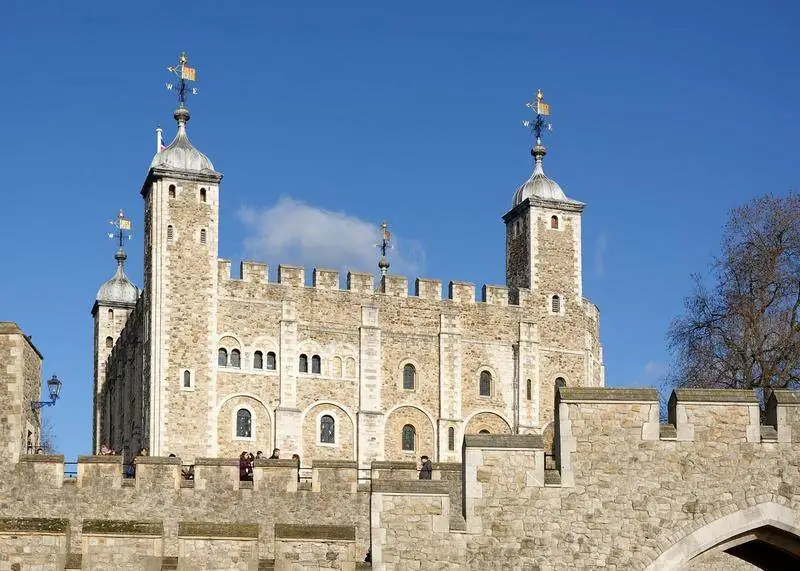
English architecture is a combination of a wide range of architectural styles, from Roman architecture to 21st-century contemporary architecture. It is thought that English architecture began with the first Anglo-Saxon Christian churches built in 597. The English Gothic style was developed in England between 1180 and 1520, influenced by France, and the Tudor style, English Baroque style, Queen Anne style and Palladian style developed after the English Renaissance.
After the Scottish Enlightenment, the architecture of England was shaped by Neoclassical architecture and Georgian architecture, and after the 1930s, it was introduced to modern architectural styles. Today, the iconic examples of English architecture, such as the Tower of London, Castle Howard, Westminster Palace, St. Paul’s Cathedral and Belfast City Hall, attract the attention of visitors.
What Religions Are Practiced In England?
The most common religion in England is Christianity, and the established church in the country is the Anglican Church.
Christianity is the accepted religion of England, but other faiths also exist in the country. The most common religions in England are Islam (4%), Hinduism (1.3%), Sikhism (0.7%), Judaism (0.4%) and Buddhism (0.4%). The proportion of the population in England that does not have a religious belief is 25.7%.
What are the National Symbols of the United Kingdom?
The national symbols of the United Kingdom are listed below.
- The Flag of the United Kingdom: The Flag of the United Kingdom, also known as the Union Jack, has a white cross and plus sign on a blue field with a red cross and plus sign above it.
- Lion: Representing strength, courage, dignity and pride, the Lion is the national animal of England.
- Britannia: A helmeted female warrior holding a trident and shield is considered the national personification of Britain.
- The National Anthem of the United Kingdom, known as God Save the King or God Save the Queen, is one of the national symbols of the United Kingdom.
What does the UK flag look like?
The flag of the United Kingdom, known as the Union Jack, has a ratio of 1:2 and features a white cross and cross on a blue field with a red cross and cross on top. The white cross on the flag is called St Andrew’s Cross, the red cross is called St Patrick’s Cross and the red cross is called St George’s Cross.
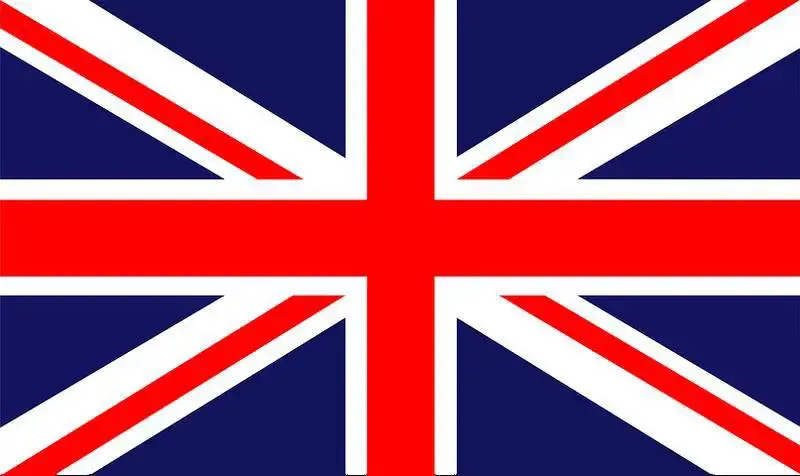
The flag of England, which is different from the flag of the United Kingdom, was adopted by England in 1190 to protect English ships entering the Mediterranean from the Genoese fleet. The flag of England has a ratio of 3:5 and bears the St. George’s cross, a red cross, on a white background.
What are the places to visit in England?
Places to visit in England are listed below.
- Tower of London
- Tower Bridge
- Windsor Castle
- Stonehenge
- British Museum
- Chester Zoo
- Big Ben
- Tower of London
- National Railway Museum
- Oxford University Museum of Natural History
- Buckingham Palace
In general, when the most famous historical places in England are mentioned, the structures in London and its surroundings mostly come to mind.
What Is England Famous For?
The prominent characteristics of the country that come to mind when England is mentioned are listed below.
- Its grand historical castles are associated with the royal family and its long history.
- English breakfast
- Prominent values of English literature, especially William Shakespeare
- World famous music groups and singers such as The Beatles, Queen, Pink Floyd
- Highly successful educational institutions such as Oxford University, London School of Economics (LSE) and Cambridge University
- Strawberries and strawberry fields
- English pubs and pub culture
- Football
- Fish and chips (a street food consisting of fish, chips and remoulade sauce)
- Wimbledon tournament
Practical Information to Know Before Going to England
Useful information that those traveling to the UK should know is included under the following headings.
How Many Hours Does It Take to Fly from Turkey to England?
Direct flights from Istanbul to London take 4 hours and 5 minutes. Other UK cities with direct flights from Istanbul include Manchester, which takes 4 hours and 25 minutes, and Birmingham, which takes 4 hours and 5 minutes. There are connecting flights from Istanbul to many cities in England, and Liverpool takes 7 hours and 15 minutes, Bristol takes 6 hours and 45 minutes, and Leeds takes 7 hours and 35 minutes.
There are direct flight alternatives from Ankara to England, and accordingly, London can be reached in 3 hours and 55 minutes, Manchester in 4 hours and 15 minutes, and Birmingham in 4 hours and 5 minutes. According to connecting flight alternatives, Liverpool can be reached from Ankara in 7 hours and 30 minutes, Bristol in 6 hours and 25 minutes, and Southampton in 5 hours and 55 minutes.
What is the Time Difference Between England and Türkiye?
Since England adjusts its time twice a year, the time difference between England and Türkiye is 2 hours in summer and 3 hours in winter.
What is the UK Telephone Code?
The UK telephone code is +44. When calling the UK from Turkey, you must first dial +44 as the UK area code.
What is the London Telephone Code?
The national dialling code for London is 020.
What is the UK Postcode?
In the UK, postcodes are alphanumeric and can range from six to eight characters in length. Each postcode is divided into two parts, the external code and the internal code. The external code contains the postcode area and the postcode district respectively, and the internal code contains the postcode sector and the postcode unit respectively. Examples of postcodes are “SW1W 0NY”, “PO16 7GZ”, “GU16 7HF” and “L1 8JQ”.
What is the UK Plate Code?
The United Kingdom’s international plate code, which was GB before 28 September 2021, has changed to UK as of the highlighted date. According to the current UK plate system adopted on 1 September 2001, plates contain a country code (optional), a two-letter area code, a two-digit age identifier code and finally three random letters to distinguish between vehicles with the same first four-character area and age sequence.
An example of a London, Sidcup number plate is given below.
What is the UK Internet Extension?
The UK internet extension is .uk and as of March 2022, there are 17,394,054 websites with this extension. Any person or organization can have a .uk extension without any restrictions or documentation. If the contact information is invalid and/or the .uk extension is obtained from outside the country, additional documentation may be requested.
What is the abbreviation for England?
The three-letter international abbreviation for England is ENG, and the two-letter international abbreviation is EN.
Where is the British Consulate?
The UK’s official foreign representations in Turkey are in Ankara, Istanbul, Izmir, Muğla and Antalya.
The UK foreign missions in Turkey and their contact information are given in the table below.
| Place | Address | Communication |
|---|---|---|
| British Embassy in Ankara | Martyr Ersan Street No: 46/A | Phone: +90 312 455 33 44 |
| British Consulate General in Istanbul | Mesrutiyet Street No: 34 | Phone: +90 212 334 64 00 |
| Izmir British Consulate | 1442. Street No: 49 | Phone: +90 232 463 51 51 |
| Bodrum British Honorary Consulate | Eskicesme, Cafer Pasa St. No: 7 | Phone: +90 252 412 64 88 |
| Honorary Consulate of England in Fethiye | Atatürk Street Likya Business Center Floor: 2 No: 202, 48300 Fethiye | Phone: +90 252 614 63 02 |
| Marmaris British Honorary Consulate | Yesil Marmaris Tourism and Yacht Management Inc | Phone: +90 252 412 64 88 |
| Antalya British Vice Consulate | Gursu District 324th Street No: 6 Konyaalti Antalya | Phone +90 242 228 28 11 |
The British Embassy in Ankara is the highest-level foreign representative of the United Kingdom in Turkey.
Where is the Turkish Consulate in the UK?
There are Turkish consulates in London and Edinburgh in the UK. The Turkish Embassy in London is located at 43 Belgrave Square London SW1X 8PA United Kingdom, while the Turkish Consulate General in the same city is located at Rutland Lodge Rutland Gardens,
Knightsbridge is located in London SW7 1BW, United Kingdom. The Turkish Consulate General in Edinburgh is located in 39 Drumsheugh Gardens, Edinburgh, EH3 7SW, United Kingdom.
How to get from Turkey to the United Kingdom?
People travelling from Turkey to the UK may need to obtain a visa first, depending on the visa regime. The UK requires visas from Turkish citizens holding ordinary passports, service passports and special passports; however, it exempts Turkish citizens holding diplomatic passports from visas for their travels to the UK, provided that their stay does not exceed 90 days within a 180-day period.
Visa applications are made online at Gov.Uk directly to the UK Visas and Immigration Agency. After the online application, an appointment must be made with the intermediary institution, after the payment process is completed on the TLS Contact website, the appointment to be made at the Visa Application Centre with the necessary documents must be attended and biometric procedures must be carried out.